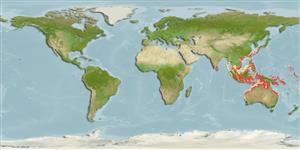Environment: milieu / climate zone / depth range / distribution range
Ecology
Marine; reef-associated; non-migratory; depth range 10 - 50 m (Ref. 90102). Tropical
Western Central Pacific: Philippines, Borneo, Singapore, Papua New Guinea, the Arafura Sea (Ref. 9819) and Western Australia to Darwin and Brisbane, Australia.
Size / Weight / Age
Maturity: Lm ? range ? - ? cm
Max length : 45.0 cm TL male/unsexed; (Ref. 48635); common length : 35.0 cm TL male/unsexed; (Ref. 9790)
Dorsal spines (total): 9; Dorsal soft rays (total): 12; Anal spines: 0; Anal soft rays: 12. No pit present behind upper eye. Preopercular spines short, usually 2 subequal. Infraorbital ridge usually smooth over eye. Suborbital ridge bearing 1slight spine just behind eye, spine often obscure or lacking in adults. No dermal papillae on upper eye. Caudal fin with a large elongate dark blotch along upper and lower margins.
Found in shallow coastal areas and reef flats to about 50 m. Usually captured by spear fishing or with ichthyocide, occasional specimen taken by trawling (Ref. 9790).
Life cycle and mating behavior
Maturities | Reproduction | Spawnings | Egg(s) | Fecundities | Larvae
Paxton, J.R., D.F. Hoese, G.R. Allen and J.E. Hanley, 1989. Pisces. Petromyzontidae to Carangidae. Zoological Catalogue of Australia, Vol. 7. Australian Government Publishing Service, Canberra, 665 p. (Ref. 7300)
IUCN Red List Status (Ref. 130435)
Threat to humans
Harmless
Human uses
Fisheries: subsistence fisheries; gamefish: yes
Tools
Special reports
Download XML
Internet sources
Estimates based on models
Preferred temperature (Ref.
123201): 24.5 - 29, mean 28 °C (based on 546 cells).
Phylogenetic diversity index (Ref.
82804): PD
50 = 0.5625 [Uniqueness, from 0.5 = low to 2.0 = high].
Bayesian length-weight: a=0.00525 (0.00246 - 0.01120), b=3.04 (2.85 - 3.23), in cm total length, based on LWR estimates for this (Sub)family-body shape (Ref.
93245).
Trophic level (Ref.
69278): 3.9 ±0.7 se; based on size and trophs of closest relatives
Resilience (Ref.
120179): Medium, minimum population doubling time 1.4 - 4.4 years (Preliminary K or Fecundity.).
Fishing Vulnerability (Ref.
59153): Low to moderate vulnerability (35 of 100).
Nutrients (Ref.
124155): Calcium = 45.6 [22.8, 113.4] mg/100g; Iron = 0.631 [0.281, 1.394] mg/100g; Protein = 17.9 [15.9, 20.0] %; Omega3 = 0.135 [0.060, 0.380] g/100g; Selenium = 36.7 [18.2, 96.3] μg/100g; VitaminA = 132 [50, 337] μg/100g; Zinc = 0.901 [0.587, 1.387] mg/100g (wet weight);
